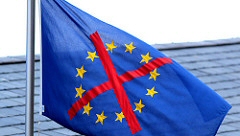Euroscepticism and the current situation triggered by Brexit

Source of original image: EU exposed
Violetta Vaski | 15 Mar 2017
Euroscepticism was always an existing phenomenon, mostly practiced by the United Kingdom, and other particular nations expressing their disagreement with several aspects of the EU framework. Although, at the beginning the establishment of the European Economic Community was widely supported by the United Kingdom, the participation was less unequivocal.
After the creation of the European Economic Community, the United Kingdom did not indicate their interest, instead joined the European Free Trade Association. Later, as the former was more successful, the United Kingdom also submitted its intention to join, but it was rejected twice by Charles de Gaulle. Finally, on the first of January 1973, the country became a member of the European Community, but it has been still referred as a “reluctant partner” in history books. The relationship with Europe was more sceptical than cooperative, due to the late affiliation (Charles de Gaulle’s rejection two times) to the EU, the physical isolation of being an island, and formerly closer ties and interests in British-American relations, than the EU.
Since being a member of the EU, the United Kingdom was not completely satisfied with the situation, which escalated into a referendum regarding membership. The result of the referendum, which was 52% on leaving, caused extraordinary echo on a global scale, as the history of international cooperation has not experienced a precedent that a country would exit from the European Union (only Greenland, as a part of Denmark succeeded in 1982, is also a 52% majority referendum).
The EU faces significant challenges; it had to come up against the open attacks of Russia on European security order (continuous aggression against Ukraine), front randomly occurring terrorist attacks, wars and conflicts in the Southern Neighbourhood and migration flows posing threats towards cohesion in previous years. At the same time, the United Kingdom decided to quit, which decision is being kept in respect by the EU. However, Many EU officials fear that the United Kingdom leaving the EU would trigger other member countries to think in the same way, but in my opinion, the EU could build back the confidence in member countries, by not allowing cherry picking, but being flexible towards negotiations. This solution would facilitate cooperation, as the sign that the EU is built on important values, but is able to negotiate common problems of society in a flexible way.
The way towards the end of concerns is inevitably long, and no one can surely predict such consequences. Still, I hope that the golden route would be found in time, allowing the best possible options for the most countries.










Leave reply